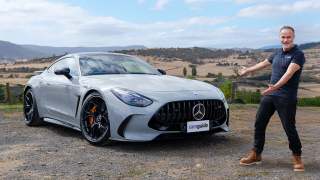
Ford Focus big changes to come
The car, which will be sold both locally and export, could utilise “first in segment technology”, according to Ford of Europe's vehicle line director, Gunnar Herrmann.
This means things like stop-start technology and Ford's ECOboost engine technology which utilises direct injection and turbocharging to deliver up to 20 per cent better fuel economy and lower emissions than comparable-capacity vehicles.
Herrmann says the next-generation Focus will also break the 100g/km CO inf2 barrier, which will be important in European countries that tax high C0 inf2 emissions.
Less than 100g/km in CO2 is currently more associated with cars smaller than the Focus.
Ford already sells a Focus model in Europe, called ECOnetic, which is powered by an 81kW 1.6-litre Duratorq TDCi engine with a particulate filter.
This car delivers an average fuel consumption of just 4.3litres for 100km, which corresponds to an average CO2 emission of only 115g/km.
Ford Australia plans to built 40,000 Focuses annually, including diesel and petrol variants.
Herrmann says the next-generation C-car platform architecture that will underpin the locally built Focus will be more flexible and cheaper to build.
It will have better attention to noise, vibration and harshness and improved quality, he says.
Ford's four-cylinder ECOboost engine can also produce more torque than a larger four cylinder engine with better fuel economy.
Herrmann cited the example of Volkswagen's twin-charger 1.4-litre four cylinder, which uses both supercharging and turbocharging to deliver the power of a higher capacity engine with the economy of a small four cylinder.
ECOboost technology could also rival hybrids and diesels for real-world economy and emissions, he says.
In Europe, diesel has previously been cheaper than petrol but rising prices have put it on a par with petrol.
Ford chief engineer ofd product development in Europe, Andreas Ostendorf, says many buyers are now moving away from turbodiesels in Europe to smaller capacity turbo petrol engines.
“That's a big change in thinking,” he says.
Turbodiesels currently dominating the European car market, representing up to 80 per cent of total European sales of small and light cars.










Comments